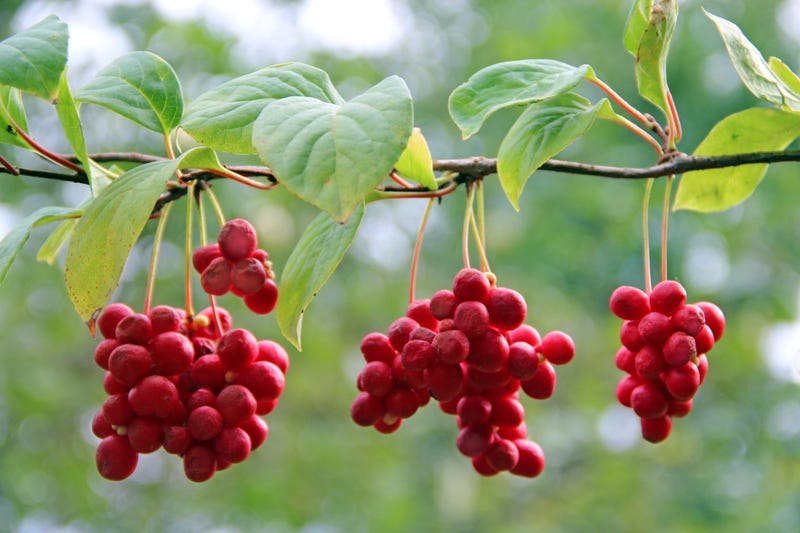This is a very quick note in response to those who wrote asking for suggestions to correct visual losses that several people associated with the recent epidemic.
As you know, I have been dealing with issues with my eyes since I was three, but herbs only came on the radar in 1972. At that time, I tried the usual recommendations: eyebright, bilberries, and all sorts of orange fruits and vegetables. I cannot actually say any of these measures helped, but schisandra has made a world of difference for my eyes.
As all of you know by now, connecting dots is one of my proclivities so here we have an adaptogen that is very well known in both Chinese and Russian herbal medicine. As you can see, it is a beautiful berry. The taste, in my experience, is predominantly sour, but the name in Chinese, wu wei zi, refers to five tastes: sour, sweet, bitter, warm, and salty taste. The Chinese system of tastes is not quite the same as the Ayurvedic which differentiates sour and astringent. Pharmaceutically speaking, this is correct because the sour taste comes from acids and the astringent from tannins that make the mouth pucker up a bit. Schisandra does actually have astringent properties.
This hugely famous member of the magnolia family is used in countless circumstances, including as an energy booster when on long journeys. Schisandra is hard to explain in a few words, but it benefits neurotransmitters so performance is enhanced by improving both concentration and endurance.
As a little aside, I became interested in adaptogens when anxious mothers were trying to help their sons in the military. Some parents sent huge quantities of herbs for sharing with others so that everyone on duty was alert and fully responsible. I am a pacifist and am 100% against war, but I fully understood the concerns of the mothers and did my best to keep everyone safe.
Sometimes, I take herbs just to experience their actions so I was not expecting such great benefits for my eyes when I tried schisandra for the first time. If there is any fatigue or flickering or blurriness, schisandra seems to correct everything for me within at least 20 minutes, sometimes faster. Obviously, different conditions might respond in other ways or perhaps not at all, but regardless of the precise actions, schisandra is a remarkable herb.
Keep in mind that to qualify as an adaptogen, the herb must be safe for long-term use so schisandra can be trusted not to cause undesirable side effects. It is known to improve lung function and to reduce coughing, to regulate both blood sugar and cholesterol, to aid sleep, to alleviate motion sickness, and to relieve nerve pain. Many claim it promotes faster recovery from injuries and surgery and that it helps to overcome sexual dysfunction and menstrual discomfort. Schisandra is a true adaptogen, but whether it helps vision might depend on many factors. I suspect it works primarily by improving circulation to the eyes, but this is already a great benefit.
As always, there can be interactions between herbs and medications. People on blood thinning or anti-seizure medications should always proceed cautiously.
Trivia for the day: lens cells in eyes live forever.
Schisandra is available on several of my websites: https://bioethikainternational.com/
Your patronage is greatly appreciated.
Copyright by Dr. Ingrid Naiman 2023 || All Rights Reserved
For permission to quote, please contact the author. Sharing via e-mail and posting links are welcome so long as the author and source are properly cited. Reprinting is strictly prohibited.
Image Credits:
Schisandra: Alexmak72427 | Dreamstime.com



Just ordered Schisandra from your website. Is this taken topically (in the eyes) or internally (mouth)? Sounds fantastic and hope it helps my aging eyes.